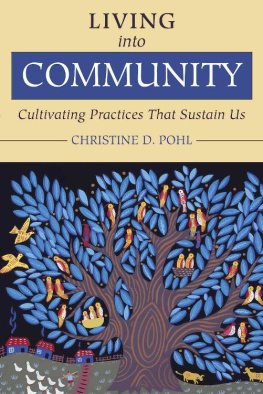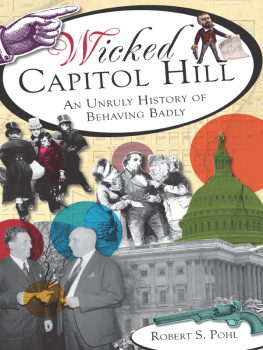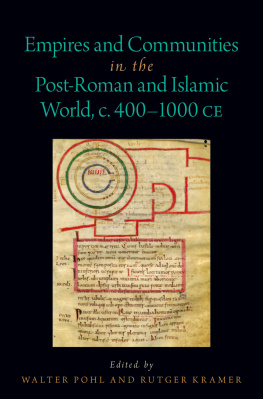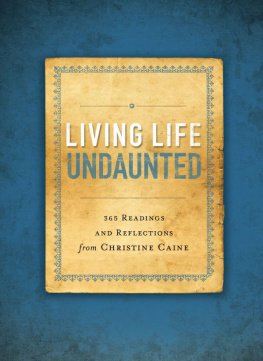Christine D. Pohl - Living into Community
Here you can read online Christine D. Pohl - Living into Community full text of the book (entire story) in english for free. Download pdf and epub, get meaning, cover and reviews about this ebook. year: 2011, publisher: Wm. B. Eerdmans Publishing Co., genre: Religion. Description of the work, (preface) as well as reviews are available. Best literature library LitArk.com created for fans of good reading and offers a wide selection of genres:
Romance novel
Science fiction
Adventure
Detective
Science
History
Home and family
Prose
Art
Politics
Computer
Non-fiction
Religion
Business
Children
Humor
Choose a favorite category and find really read worthwhile books. Enjoy immersion in the world of imagination, feel the emotions of the characters or learn something new for yourself, make an fascinating discovery.
- Book:Living into Community
- Author:
- Publisher:Wm. B. Eerdmans Publishing Co.
- Genre:
- Year:2011
- Rating:5 / 5
- Favourites:Add to favourites
- Your mark:
- 100
- 1
- 2
- 3
- 4
- 5
Living into Community: summary, description and annotation
We offer to read an annotation, description, summary or preface (depends on what the author of the book "Living into Community" wrote himself). If you haven't found the necessary information about the book — write in the comments, we will try to find it.
Living into Community — read online for free the complete book (whole text) full work
Below is the text of the book, divided by pages. System saving the place of the last page read, allows you to conveniently read the book "Living into Community" online for free, without having to search again every time where you left off. Put a bookmark, and you can go to the page where you finished reading at any time.
Font size:
Interval:
Bookmark:
Living into Community
Cultivating Practices That Sustain Us
Christine D. Pohl
William B. Eerdmans Publishing Company
Grand Rapids, Michigan / Cambridge, U.K.
2012 Christine D. Pohl
All rights reserved
Published 2012 by
Wm. B. Eerdmans Publishing Co.
2140 Oak Industrial Drive N.E., Grand Rapids, Michigan 49505 /
P.O. Box 163, Cambridge CB3 9PU U.K.
www.eerdmans.com
Printed in the United States of America
Library of Congress Cataloging-in-Publication Data
Pohl, Christine D.
Living into community: cultivating practices that sustain us / Christine D. Pohl.
p. cm.
Includes bibliographical references (p. ) and index.
ISBN 978-0-8028-4985-4 (pbk.: alk. paper)
eISBN 978-1-4674-3186-6 (ePub)
eISBN 978-1-4674-1469-2 (Kindle)
1. Christian life. I. Title.
BV4501.3.P635 2011
248.4 dc23
2011040634
Unless otherwise noted, the Scripture quotations in this publication are from the New Revised Standard Version of the Bible, copyright 1989 by the Division of Christian Education of the National Council of Churches of Christ in the U.S.A., and used by permission.
Contents
Introduction: Four Practices That Sustain Community
Stop wasting time running after the perfect community. Live your life fully in your community today.
Jean Vanier, Community and Growth
This breakdown could have been avoided. But then, few breakdowns in community are inevitable. In this case, some folks made several poor decisions. Other people responded poorly to the poor decisions. More decisions, more responses, more trouble. Words were exchanged, positions hardened, sides drawn up. Rumors flew, and even when folks knew they were rumors, they repeated them until it was very difficult to discern what had really happened.
People were angry and hurt; some conversations stopped, and new alliances were formed. Only certain people knew about key meetings. A lot of energy was expended in determining motives, justifying decisions, and anticipating the oppositions next move. Regular activities continued, but the life was drained out of them; everything seemed hollow. Small acts and casual comments were freighted with huge symbolic meaning. Everyone felt undervalued and betrayed by someone; a number of people threatened to leave. The meltdown had taken on a life of its own.
Friends questioned one anothers commitments; grumbling and weariness became highly contagious. Disagreements took strange turns; old differences and hurts came to the surface and played into the present trouble in unpredictable ways. Some people ducked, determined to weather the storm without being drawn into it. Others defected in place showing up when the occasion required it, but emotionally and relationally absent or detached. A few seemed to add fuel to the fire, reporting the latest outrageous development and speculating on what might happen next. Still others tried to keep conversations going and looked for resolution, but were often battered or sidetracked in the process. Several years later, members of the community continue to live with the wounds, even as they move forward.
Is this a description of a church? A school? An intentional community? A parachurch organization? An extended family? Because these breakdowns are common and painful, even general descriptions can evoke many memories. Places, events, personalities, and consequences flood our thoughts. Weve been there. We remember the feelings of disappointment, hurt, helplessness, betrayal, and anger. And we often remember the sense of having been sullied by the experience. Perhaps we wanted to make things better, but found it nearly impossible in the moment. Wed been caught in the downward pull of a whirlpool that was not leading to anything good.
When these breakdowns happen in Christian communities, the costs go beyond the shattering of valued relationships, important projects, or a shared future. The best testimony to the truth of the gospel is the quality of our life together. Jesus risked his reputation and the credibility of his story by tying them to how his followers live and care for one another in community (John 17:20-23).
If we could cut through our complacency or despair, we might be shocked at what is really at stake here. The character of our shared life as congregations, communities, and families has the power to draw people to the kingdom or to push them away. How we live together is the most persuasive sermon well ever get to preach.
The beauty of loving communities does not replace the importance of the verbal proclamation of the gospel, but Jesus explicitly linked the truth of his life and message to our life together. The Word who became flesh and lived among us full of grace and truth expects that our relationships with one another will also be characterized by grace and truth. And so, for two thousand years, Jesus followers have been forming communities built and sustained by love, though often also fractured by sin and corruption.
The desire to be part of communities that are vibrant, caring, and faithful keeps us working at the task of building and repairing congregations. When folks enjoy being together, share celebrations, and walk through hard times with grace and love, the beauty of their shared life is deeply compelling. Human beings were made for living in community, and it is in community that we flourish and become most fully human.
Unfortunately, experiences of moral failure, group meltdowns, personal pettiness, and partisan harshness in congregations and communities make us wonder if our efforts in building community are worth the trouble. We often invest great hope in our Christian communities, and when there are serious ruptures, it feels as if part of the kingdom has been trampled. How is it that people who want closer relationships and deeper experiences of shared life sometimes find themselves in terribly difficult situations sorting out betrayals, broken commitments, and creeping cynicism?
Longing for Community
Growing into the likeness of Christ and into the church as its supposed to be cannot be separated from the messiness and disappointments that are part of human relationships. We can protect ourselves from such difficulties only by cutting ourselves off from our relationships, and that is rarely a satisfactory option. Nevertheless, we can build and maintain congregations just like we do with marriages, families, monastic communities, and businesses in better and worse ways. Good communities and life-giving congregations emerge at the intersection of divine grace and steady human effort.
Biblical descriptions of the church as Gods household, as the body of Christ, and as a new family of brothers and sisters leave many of us dissatisfied with church life that is defined by a weekly worship service and an occasional committee meeting or mission project. The biblical images suggest closer and more significant relationships and a life together that draws people in.
Religious as well as secular researchers have recently rediscovered the human need to belong, and describe various versions of our longing for community a place where one is known, or at least a group where everybody knows your name. Our cultural emphasis on personal freedom and self-fulfillment has left many people lonely and emotionally fragile. Many of us are looking for community.
Our yearnings to belong and our desire for lasting relationships, however, are often accompanied by uncertainty about making commitments. As one person put it, it would be so much easier if we could be connected without being encumbered. Despite the fact that many of us claim to be dissatisfied with individualism, we cherish our capacity to make individual choices and to seek opportunities for personal growth.
While we readily recognize the ways in which the larger culture challenges Christian beliefs and commitments, we dont always notice how profoundly our expectations, desires, and practices are also shaped by our culture. We bring the values of self-actualization, individual success, consumption, and personal freedom and the choices that result from them to church life, just as we bring them into family and work.
Next pageFont size:
Interval:
Bookmark:
Similar books «Living into Community»
Look at similar books to Living into Community. We have selected literature similar in name and meaning in the hope of providing readers with more options to find new, interesting, not yet read works.
Discussion, reviews of the book Living into Community and just readers' own opinions. Leave your comments, write what you think about the work, its meaning or the main characters. Specify what exactly you liked and what you didn't like, and why you think so.












